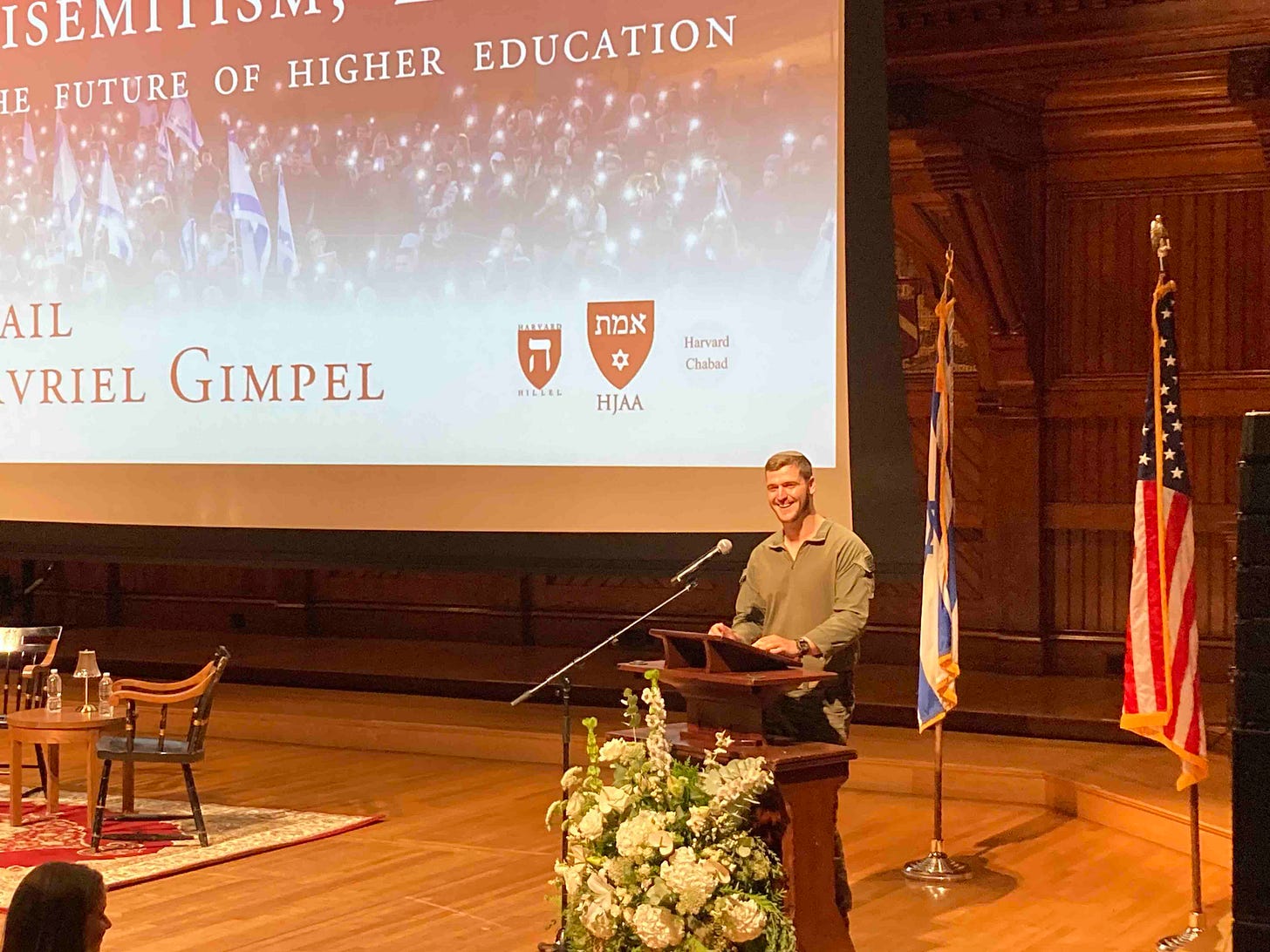“Choose To Be Brave,” an Israeli Soldier Tells Harvard’s Jews
Another speaker at alumni event says “students should feel ripped off.”

The tone for the Harvard Jewish Alumni Alliance event that filled Sanders Theater on Sunday afternoon was set early on by an Israeli mother named Avigail Gimpel. She talked about her work as a volunteer with a burial society in Israel that, after the Hamas-led terrorist attack of October 7, 2023, received bodies that were headless and others that were burned alive.
On October 7 she was relieved that her son Gavriel, who had recently finished his mandatory Israeli army service, had his arm in a cast and wouldn’t be called up. Her son sawed the cast off that night and told his mom he was going to fight.
“Choose to be brave,” Gavriel Gimpel, 23, told the Harvard audience.
The event was designed to reinforce the themes of unity, truth, and courage.
The U.S. government’s Special Envoy to Monitor and Combat Antisemitism, Ambassador Deborah Lipstadt, cited a U.S. intelligence finding that Iran has “amplified” demonstrations on campus.
“Much of this is not organic,” Lipstadt said, speaking of the campus protests.
Lipstadt said she is able to do her job because she understands not just the idea of a Jew “as object” of antisemitism, but a Jew “as subject,” knowledgeable and with agency.
“You need to know what it is you are fighting for, not just what you are fighting against,” she said, saying that those combating antisemitism are fighting for the best of America.
“Be better Jews. Speak the truth,” the founder and president of Harvard Chabad, Rabbi Hirschy Zarchi, exhorted the audience.
Speaker after speaker stressed the significance of the campus antisemitism fight.
Harvard plays a “pivotal role in building the future leadership of the free world,” said Israel’s new consul general to New England, Benjamin Sharoni.
“These are the modern churches. These are the places where ideas are being shaped,” said Einat Wilf, a former member of Israel’s parliament.
“Universities actually matter,” Wilf said, calling them a “central arena, not a sideshow.”
A former member of Harvard’s antisemitism advisory group, author Dara Horn, offered an extensive and damning portrayal of Harvard’s failures.
“Why is Harvard filled with screaming racists?” she asked.
She called the education “academic malpractice for $80,000 a year.”
“Racist lies are taught in class,” she said, pointing to examples compiled by the Harvard Jewish Alumni Alliance in its audit.
“Students should feel ripped off,” she said.
She said the tenure process rewards conformity, and students are also tempted to echo professors to get good grades. “It does not look like academia is attracting courageous people,” she said.
She drew a contrast with “nonconformity rooted in Torah,” “resistance to idolatry,” and “the refusal to bow to tyrants.”
“In the 1930s German universities were the best in the world,” Horn said, warning that Harvard and similar institutions could follow in their path of decline.
To the audience, Horn quoted God’s biblical injunction to Joshua: חֲזַ֖ק וֶאֱמָ֑ץ, “Be strong and courageous.”
Horn’s message about Harvard’s educational quality was a harsh one. So were the anecdotes that Jewish students and campus rabbis shared about how they’d been ostracized, lied about, and discriminated against.
But there were some hopeful signs too.
Harvard and Cambridge provided NATO summit-level, shock-and-awe-style security that successfully deterred anti-Israel protesters from disrupting the event as they had threatened to do. The number of police and the firepower they had amassed outside the event may have exceeded the military power of some small sovereign countries. You could say it was a bad sign that so much muscle was considered necessary, but I took it as a positive that, at least on this day, the university and the city of Cambridge were determined and able to keep their Jews and Israeli visitors safe and secure.
That so many alumni, students, and parent volunteers put so much time and energy and money into so emphatically, eloquently, and precisely telling Harvard how badly it has gone off the rails may be, in a paradoxical way, a sign of the institution’s underlying strength. The university should give the lot of them—the event chair, Harvard Hillel and Harvard Jewish Alumni Alliance board member Laura Fein and her committee, Rabbi Zarchi and his wife Elkie, the Harvard Jewish Alumni Alliance board led by Eric Fleiss—medals, or honorary degrees. Even better, Harvard should listen to and implement their advice on how to help turn the place around.
“We are fighting back against the hate,” the co-president of Harvard Chabad, a Harvard senior, Alex Bernat, said. “I and many others are proud to be Jewish at Harvard and we are here to stay.”
Thank you: The Editors is a reader-supported publication. If you can spare the $8 a month or $80 a year, please become a paying subscriber today and ensure your continued access, support our growth, and sustain our independent journalism.



What is most encouraging about this, judging from this report, is the call for Jews to stay strong. That is, to not play the victim and ask to be admitted to the victimhood competition of DEI, which would be worse than doing nothing. Jewish students do not need Harvard administrators to help them cope or feel better. They need Harvard to change in very painful and fundamental ways.
Before the Harvard Jewish Alumni Alliance event there was a brunch for alumni at Harvard Hillel, attended by about 100 people. President Garber came and stayed for well over half an hour, talking with many alumni. Garber left the impression that there was much more being done to improve the climate than is currently known publicly.